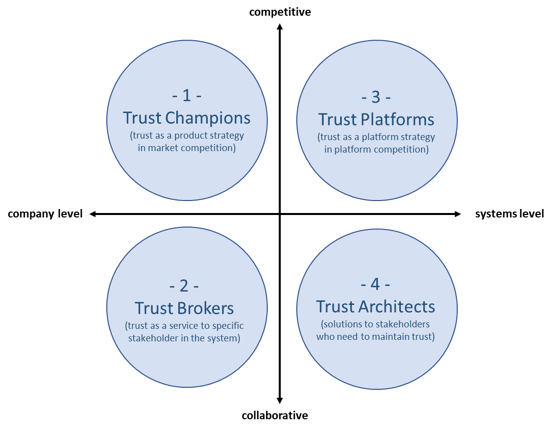Business is facing an existential trust crisis, a recent article found. Companies from Boeing to Facebook are losing the public’s faith by paying insufficient attention to trust as an important ingredient for answering their stakeholders’ needs. But where there is a crisis, there is an opportunity, too. How can business leaders turn trust into a competitive advantage?
Trust matters because it is a prerequisite for collaboration. To trust means to make oneself vulnerable to the actions of others because one believes in their good intentions and their ability to turn these intentions into outcomes. Opinion surveys suggest that this readiness is waning – or at least unevenly distributed: trust in small businesses is still very high, but big businesses are hardly trusted.
And, while Big Tech is still leading sectoral trust rankings, it seems to be jeopardising its pole position. Over the last months, consumers learned that Amazon, Apple, Facebook, Google and Microsoft listened in on users’ voice commands, that a Google outage locked users out of their homes and disabled baby monitors, and that Boeing outsourced software for its 737 Max to $9-an-hour engineers.
The faltering confidence in business is not only calling regulators to the plan; it is also clearing the way for trust as a differentiator. Four strategic options are crystalising in this new game of trust. One is about trust as a product strategy; the second is about trust as a service; the third is about trust as a platform strategy; the fourth is about open architectures that help all actors up their trust game (see Figure 1).
Figure 1. The new trust economy

The first strategic option, to embrace trust as a product strategy: we call companies that do this “Trust Champions”. The American consumer electronics firm Sonos is one recent example. It is competing with Google, Amazon and Apple in the smart speaker market, and just launched a new product of which the unique selling point is trust-based: it does not have an internal microphone. The Sonos SL can’t react to voice-commands in the way other smart speakers can, but it also cannot listen to what people say in the privacy of their homes: you can trust it not to snoop on you.
“There is a group of people who just don’t want microphones in their house,” Sonos’ chief executive officer Patrick Spence explained, right after unveiling its microphone-less speaker. “We thought it was a good opportunity to… give peace of mind to people that want it”.
It is too early to tell, whether this decision will help the consumer electronics pioneer expand its share of a market which is dominated by Google and Amazon, but in the wake of rampant privacy violations by large tech firms, Sonos is not alone in betting on privacy as a competitive edge. Amongst the most imminent companies are children’s toy-makers like the iconic Lego brand, which decided against social media buttons for its “Lego Life” social network upon realising that it was unable to control what type of data these would transmit. It is just one of many “safety first” features that are front and centre to the success of its online universe which in its first year attracted six million kids.
In time for last year’s Christmas shopping season, the open source software firm Mozilla published its second annual “privacy not included”, rating 70 products, ranging from toys and smart speakers to a sous vide cooker. In the “toys & games” section, only five products met Mozilla’s minimum-security standards. Whilst acknowledging that the number of products shown is “a drop in the bucket”, Ashley Boyd, Mozilla’s VP of advocacy, explained that the purpose of this list was “to drive a conversation where manufacturers can see that consumers care about this information”.
While voluntary privacy standards like the Trustable Technology Mark (by Mozilla and ThingsCon) are still in their infancy, topics like sustainability, health and safety are already ranking high in trust-based product strategies. In 2012, Jessica Alba started the Honest company, which challenged the consumer giant Procter & Gamble with an eco-friendly and affordable alternative to Pampers diapers and wipes, before expanding into cleaning, beauty and other items. The celebrity start-up attained unicorn status with a valuation of more than $1 billion in only three years.
The Honest company is a shining example of how to compete on the basis of trust – but a cautionary tale, too. After its meteoric rise, issues related to quality control and product labelling damaged both its image and its valuation. Whilst a leadership change, a slimming down of its product line, as well as bold investments into quality assurance put the company back on track, the slump holds an important lesson for trust champions: the harder you compete on the basis of trust, the harder you are likely to be hit when you don’t put your actions where your mouth is.
“Trust Brokers” are providing trust as a service. Their goal is to help other companies gain or maintain trust. The New York-based software company Sourcemap, which specialises in mapping global supply chains for companies, is one example. Greater supply chain transparency, argues its CEO Leonardo Bonanni, “allows companies to charge higher prices and avoid reputational risks.”
Sourcemap’s clients include familiar names in the fashion sector (Timberland, Vivienne Westwood, Van’s, and Jansport, for example) and in the food industry; Hershey and Mars are using the platform, which tracks, amongst others, over 250,000 cocoa farms to counter illegal deforestation, human rights violations, and child labour in their supply chains.
The London-based start-up Everledger uses a different approach to brokering trust. It uses Blockchain technology to track the provenance of luxury goods like diamonds. In supply chains, instances of fraud, document tampering and illegal trafficking are often rooted in the lack of visibility that comes with old paper-based certification systems. Everledger partners with diamond certification houses around the globe to create a digital thumbprint for individual stones which it then stores, visible for all parties, in a tamper-proof decentralised database.
Today, over 1.2 million diamonds are digitally stored on the Everledger blockchain, and the company started to roll out its model to supply chains from gemstones to minerals, wines, artworks and other luxury goods and related insurance businesses.
The third, and most established, approach to brokering trust is the growing certification industry itself. With environmental, social and corporate governance (ESG) more and more recognised as indicators of risk and future financial performance, a lot is at stake for businesses when it comes to building trust in sustainability efforts.
Countless certification businesses emerged to broker this trust, ranging from the building certification LEED – to date the most widely used green building rating system in the world – to B Corp which certifies the sustainability of a business overall. Testing, inspection and certification is already a $210 billion market and expected to grow by five per cent (CAGR) as manufacturers are certifying their products and services to gain the trust of customers.
“Trust Platforms” are next. Unlike Trust Champions and Brokers, they focus on the systemic dimension of trust building, realising that trust is not only about the intentions and abilities of individual actors but an attribute of the ecosystem that brings stakeholders together.
One of these ecosystems is the growing market for freelance labour. According to Gallup, more than a third of all US workers – ca. 57 million people in total – have a gig work arrangement in some capacity, using platforms like Uber or Task Rabbit. But whilst these platforms created huge fortunes for a small number of people, poor salaries and safety nets eroded trust in their fairness.
While policy-makers are debating how to regulate the gig-economy and update social safety systems, stakeholder-owned digital cooperatives emerged with the promise to bring fairness to gig work. Digital “co-ops” promise to make gig-work, from chauffeuring to photographing, more fairly paid, and allow all stakeholders to be part of the decision-making.
The stock photography site Stocksy United is such a cooperative. It was created in 2013 with a mission to provide “genuine, unique and well-executed images to clients and a fair deal to members” as CEO Michael Cook puts it. But while market leaders like Getty Images take 80 per cent commissions, Stocksy artists get between 50 and 75 per cent of every licence sold, and its artists are also shareholders, who get to decide on the direction the company takes.
According to founder Brianna Wettlaufer, the approach works: Stocksy “has built trust and loyalty, as well as confidence that decisions are being made in the best interests of the membership.” It proves a sound business model too: Stocksy was cash-profitable from its first year (2013), paid out US$ 5.7 million in royalties and US $300,000 in dividends to its artist-shareholders in 2017, and from an initial six founding employees reached a payroll of about 50 by 2019.
In other sectors too, co-ops are on the rise. Almost every major digital platform is facing competition from digital cooperatives. Instead of Uber or Lyft, more and more cities are piloting rideshare co-ops to ferry people around town, and co-ops like Up & Go emerged to challenge platforms like TaskRabbit where people offer services from cleaning to delivery. Many of these platform pioneers won’t succeed in turning their trust advantage into a competitive advantage but even those who fail will help refine a model that might be here to stay.
“Trust Architects” are possibly the most radical as they reimagine the social and technical foundations upon which trust is built. Whilst driven by different values, pursuing different objectives and taking on diverse legal shapes and forms, they all aim to build new architectures for collaboration that produce trust in open and decentralised settings.
A prominent example is blockchain. In technical terms a mechanism to reach a consensus without a central authority to facilitate the process, early initiatives were motivated by the aim to disrupt entire sectors from banking to real estate. Today, many initiatives like the distributed ledger platform Corda, a product of the enterprise software firm R3, or the open source blockchain project Hyperledger which is hosted by the Linux Foundation and built with support from IBM, Intel and SAP, are the underlying operating systems for trust champions and brokers alike.
Another prominent architectural effort called Solid is a platform championed by Tim Berners-Lee, one of the inventors of the world wide web. Solid specifically seeks to resolve trust deficits with regards to data ownership. Applications built on top of the open source architecture will give individuals, rather than corporations, full control of their data. Similar to blockchain initiatives, Solid is treating trust as a systems property, rather than an asset of individual organisations. According to John Bruce, the CEO of Inrupt, a software firm that is driving the development of Solid, pilots with large for- and non-profit organisations are on their way. As an open-source architecture, Solid could both help big businesses strengthen stakeholder trust and serve as launch pad for start-up business and operating models that advance a more inclusive digital economy.
While technologies such as blockchain or Solid are powerful devices in the toolbox of leaders, they are not sufficient for building new architectures of trust. To reap the benefit of blockchain in supply chains, for instance, stakeholders need to address tricky questions regarding data privacy, security, creation and use of data, interoperability, digital identity and signatures. Our organisation, the World Economic Forum, a Geneva headquartered international organisation for public-private cooperation, aims to fill this gap. In the realm of supply chains, it just announced that 100 influential ports, shippers and supply chain companies joined its Redesigning Trust initiative, an effort to co-design governance frameworks for accelerating the most impactful uses of blockchain in port systems.
Trust is the operating system of successful societies. Its erosion in the face of unprecedented levels of corporate power and a perceived surge of intended and unintended corporate wrongdoings gave rise to a new ecosystem of trust champions, brokers, platforms and architects. Market leaders need to tap into this ecosystem to make sure they don’t jeopardise their competitive edge by losing their public’s faith; smaller actors may enjoy greater societal trust but face the mammoth challenge of converting their trust advantage into a competitive advantage.
But the game of trust is not a zero-sum game. Trust is not a resource that is depleted with use. It is a muscle that gets stronger with exercise. The trust crisis is thus a trust opportunity, too; an opportunity to build an operating system for more cohesive and sustainable societies.
♣♣♣
Notes:
- The post gives the views of its author(s), not the position of LSE Business Review or the London School of Economics.
- Featured image by Cosimo Miorelli, © All rights reserved. Licence acquired by the authors. NOT under Creative Commons.
- When you comment, you’re agreeing to our Comment Policy
 Sebastian Buckup is head of programming, Global Programming Group, and member of the executive committee of the World Economic Forum. He has a PhD in economics from Witten/Herdecke University, Germany, and an MSc in international political economy from LSE. He is a visiting professor, IOMBA programme, University of Geneva.
Sebastian Buckup is head of programming, Global Programming Group, and member of the executive committee of the World Economic Forum. He has a PhD in economics from Witten/Herdecke University, Germany, and an MSc in international political economy from LSE. He is a visiting professor, IOMBA programme, University of Geneva.
 Peter Vanham is head writer at the World Economic Forum. Previously he worked as a consultant for Bain & Company, as US country manager for Tour de France winner Eddy Merckx, and as founder and gardener in his own company, Via Verde. Peter holds an M.A. in business and economics journalism from Columbia University and an M.Sc. in commercial engineering from his alma mater in Belgium, the Catholic University of Leuven. His first book, “Before I Was CEO” (Wiley, 2017), tells the life stories and lessons from leaders before they reached the top.
Peter Vanham is head writer at the World Economic Forum. Previously he worked as a consultant for Bain & Company, as US country manager for Tour de France winner Eddy Merckx, and as founder and gardener in his own company, Via Verde. Peter holds an M.A. in business and economics journalism from Columbia University and an M.Sc. in commercial engineering from his alma mater in Belgium, the Catholic University of Leuven. His first book, “Before I Was CEO” (Wiley, 2017), tells the life stories and lessons from leaders before they reached the top.






Thank you for this well researched and insightful article